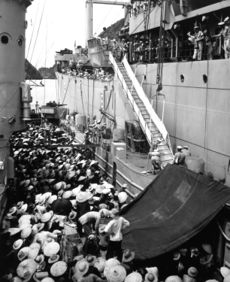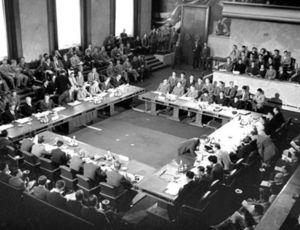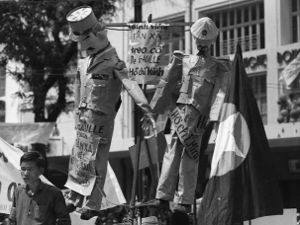مؤتمر جنيڤ (1954)
مؤتمر جنيڤ (26 أبريل 1954[1]) هو مؤتمر عقد بهدفين. الأول هو حاولة إيجاد طريقة لتوحيد الكوريتين. والثاني هو مناقشة إمكانية تحقيق السلام في الحرب الهندية الصينية.[2] The Soviet Union, the United States, France, the United Kingdom, and the People's Republic of China were participants throughout the whole conference while different countries concerned with the two questions were also represented during the discussion of their respective questions,[3] which included the countries that sent troops through the UN to the Korean War and the various countries that ended the French Indochina War between France and the Vietminh. The part of the conference on the Korean question ended without adopting any declarations or proposals. Some participants and analysts blame the U.S. for obstructing movements towards unification.[3][4][5] On Indochina, the conference produced a set of documents known as the Geneva Accords. These agreements separated Vietnam into two zones, a northern zone to be governed by the Vietminh, and a southern zone to be governed by the State of Vietnam, then headed by former emperor Bảo Đại. A "Conference Final Declaration", issued by the British chairman of the conference, provided that a "general election" be held by July 1956 to create a unified Vietnamese state. Although presented as a consensus view, this document was not accepted by the delegates of either South Vietnam or the United States. In addition, three separate ceasefire accords, covering Cambodia, Laos, and Vietnam, were signed at the conference.
خلفية
كوريا
الهندية الصينية
المسألة الكورية
اتفاقيات جنيڤ
اتفاقيات واستجابات جنيڤ
أحداث ما بعد الإعلان

العلاقات البريطانية الصينية
الهوامش
- ^ Young, Marilyn (1991). The Vietnam Wars: 1945-1990. New York: HarperPerennial. p. 41. ISBN 9780060921071.
- ^ "Indochina - Midway in the Geneva Conference: Address by the Secretary of State". Avalon Project. Yale Law School. May 7, 1954. Retrieved 29 April 2010.
- ^ أ ب "The Geneva Conference". Ministry of Foreign Affairs of the People's Republic of China. 2000-11-17. Retrieved 29 April 2010.
- ^ Hart-Landsberg, Martin (1998). Korea: Division, Reunification, & U.S. Foreign Policy. Monthly Review Press. pp. 133–138.
- ^ Halliday, Jon; Cumings, Bruce (1988). Korea, The Unknown War. Pantheon Books. p. 211 The Canadian representative, Ronning said: The communists had come to Geneva to negotiate....I thought I had come to participate in a peace conference....Instead, the emphasis was entirely on preventing a peace settlement from being realized....There was no excuse for closing the conference without a peace agreement. Molotov's resolution....could have been accepted as a basis for a settlement by most of the Sixteen [states that fought under the UN flag].
انظر أيضا
- مؤتمرات جنيڤ أخرى
- كوريا
- الحرب الكورية
- كوريا الجنوبية
- كوريا الشمالية
- ڤيتنام
- الحرب الهندية الصينية الفرنسية
- الحرب الڤيتنامية
- ڤيتنام الجنوبية
- ڤيتنام الشمالية
وصلات خارجية
- "The Geneva Conference of 1954 - New Evidence from the Archives of the Ministry of Foreign Affairs of the People's Republic of China" (PDF). Cold War International History Project Bulletin. Woodrow Wilson International Center for Scholars (16). 2008-04-22. Retrieved 2009-04-14.
- Indochina - History links for French involvement in Indochina, casahistoria.net
- Vietnam - History links for US involvement in Indochina, casahistoria.net
- Bibliography: Dien Bien Phu and the Geneva Conference
- Foreign Relations of the United States, 1952-1954, volume XVI, The Geneva Conference. Available through the Foreign Relations of the United States online collection at the University of Wisconsin.




